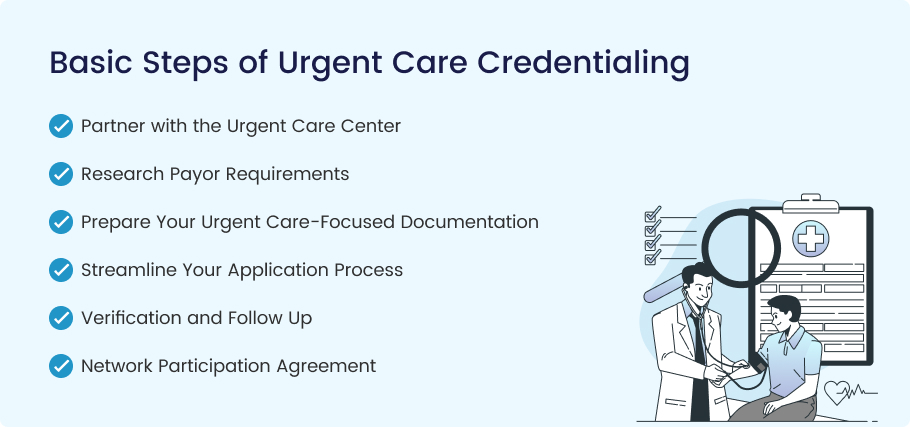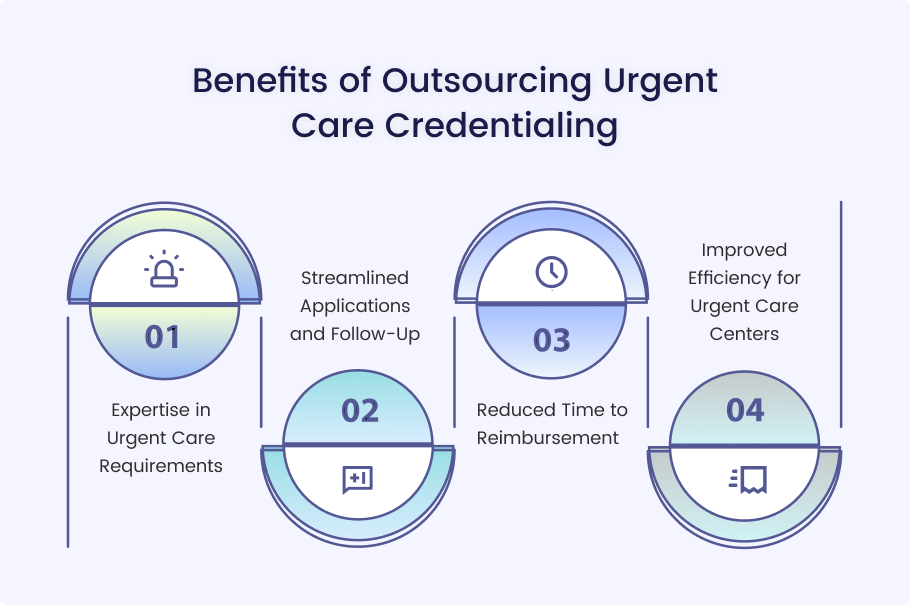
In the world of urgent care, credentialing is a critical determinant of smooth patient flow and timely service. Regardless of whether you are an experienced urgent care provider or still in the credentialing phase, compiling the payer credentialing requirements across settings and states can be quite challenging.
This blog is devoted to providing you with information on all aspects of urgent care credentialing needs. In this blog, we will provide the basic steps of credentialing, requirements for providers, its cost, and benefits of outsourcing urgent care credentialing to a reliable urgent care medical billing service provider.
Urgent care credentialing is the process of ensuring that the provider meets the requirements of treating patients under the insurance networks accepted by the urgent care centers. It entails the urgent care facility assessing the validity of your licenses and fitness, and every insurance company conducting a background check on your qualifications and experience.
This makes sure that you meet their requirements to be able to treat patients as well as enable the center to bill insurance for your services. It can be time-consuming and could take months; therefore, early preparation and proper planning are advised.
Here is a breakdown of the basic steps that need to be followed for the credentialing process in an urgent care setting.
Partner with the Urgent Care Center
Consult with the urgent care center’s credentialing officers to find out which insurance firms they deal with. These are your initial targets. They might also have detailed prerequisites for the urgent care staff; therefore, do not hesitate to discuss them at the time of recruitment.
Research Payor Requirements
Like in any other health care facility, various insurance companies have their own unique credentialing process. Research their websites or contact their dedicated urgent care credentialing departments (if offered) to understand.
- Urgent Care-Specific Requirements: Certain insurers may have additional particularities that are related to the experience of the urgent care providers in treating specific types of urgent conditions.
- Documentation Needs: This generally covers your license and any other certificates that would be useful for the professions that relate to urgent care. e.g., area of specialization (primary care, urgent care medicine, emergency medicine), DEA registration, malpractice insurance, NPI number, and any existing sanctions.
- Application Procedures: There may be some insurance companies that utilize the CAQH, while others may possess their own application systems meant for urgent care providers.
Prepare Your Urgent Care-Focused Documentation
Compile all the documents that have been requested by each insurance company, particularly considering your qualifications for urgent care. If you have certifications relevant to urgent care, ensure they are included in your resume. Provide documentation supporting clinical experience in addressing urgent care conditions.
Streamline Your Application Process
Review if the CAQH is available and should be used for urgent care credentialing. This can help some insurers reduce their efforts when applying for licenses. In the case of submitting separate applications for different insurers, avoid complicating the process by not mentioning the words ‘urgent care’ where necessary.
Verification and Follow Up
Always be patient whenever an insurer is going through one’s records to verify the information from the original source. Due to the fact that these urgent care centers treat many patients, it is recommended to get in touch with insurance companies if the processing time appears to be longer than expected. This will enable you to test whether everything is in order when preparing to see patients.
Network Participation Agreement
Once approved, you are expected to sign a network participation agreement that will define your status as a provider within the insurance company’s network. When you receive the contract, make sure to read through the text thoroughly and look especially for the sections that may pertain to urgent care.
By achieving these steps, you will be on your way to giving the best care to patients, especially in the ER and urgent care settings.
Opportunities to work as a healthcare professional in a given urgent care center provide numerous advantages. However, whenever one is preparing to plunge into the credentialing process, it’s important to know what it entails. Here’s a breakdown of the key requirements:
State Licensure and National Certification
State License: This is an absolute must. The physician (MD), the osteopathic physician (DO), or the certified registered nurse practitioner (NP) must have the license to work in the state where there is an operating urgent care center.
Urgent Care-Specific Certifications (Optional but Advantageous): Although it is not mandatory, most insurers or urgent care centers may request providers with certifications in line with urgent care. These might include:
- Urgent Care Medicine Certification
- Emergency Medicine Certification
Federal Requirements
National Provider Identifier (NPI) Number: It is mandatory for most healthcare providers who work with Medicare or Medicare-claiming facilities. To get the NPI number for free, go to the National Plan and Provider Enumeration System (NPPES) [invalid URL removed].
DEA Registration (if applicable): If you are planning to prescribe controlled substances often in an urgent care facility, then it is recommended to have a DEA (Drug Enforcement Administration) registration number.
Additional Documentation
Board Certifications: Certifications received before applying for a particular doctoral or MD program, or the current ones, may be helpful to your application.
Malpractice Insurance: Having the right professional liability insurance is mandatory.
Curriculum Vitae (CV): A curriculum vitae, which includes details of education and experience as well as skills, is usually expected. Emphasize your practice in the first-person, using your nursing experience to care for patients with urgent care-type illnesses.
Professional References: Be ready to submit contact details of other professionals in your field that can attest to your professionalism.
Sanction Information (if applicable): If you have any malpractice claims or disciplinary actions concerning your case, they must be mentioned during the credentialing process.
There may be costs that you have to incur at the beginning of the credentialing process when it comes to urgent care, but if you plan properly, the costs can be controlled. The cost expected to be charged by insurers per provider is between $100 and $300 per plan. When managing your budget for enrollment, focus on important insurers, use CAQH, negotiate on service fees, and begin the process early, especially to avoid rush processing fees.
The specific urgent care center may provide the patients with financial aid or even know which credentialing services to go to to alleviate the cost. With these possible expenses in mind and using these precautions, you will be ready to make a seamless financial move to your urgent care job.
Learning the credentialing process in an environment such as urgent care is quite challenging. It is under this circumstance that outsourcing this process to a credentialing service should be considered since it can give much-needed relief in handling such tasks so that more time can be dedicated to what is most important—patient care.
Here’s how outsourcing can specifically streamline your urgent care credentialing journey:
Expertise in Urgent Care Requirements
Healthcare credentialing services primarily address the credentialing needs of clinics, hospitals, and other healthcare facilities, and many of them specifically cater to the urgent care niche. This expertise means they appreciate the general details of contract affiliate urgent care provider credentialing and can recognize insurer requirements for urgent care experience or certifications.
Streamlined Applications and Follow-Up
Credentialing services offer a solution to the sometimes cumbersome process of submitting forms to the various insurers while guaranteeing accuracy and completeness. They can also handle the communication and follow-up with insurers on your behalf, so you do not have to spend time tracking the status of your applications.
Reduced Time to Reimbursement
This means that when credentialing works at a faster pace, the health care provider is equally able to attain in-network status with the insurance companies quickly. This implies that you can begin to see patients and start billing for services as soon as possible. It greatly reduces the time one takes before starting the financial break-even point.
Improved Efficiency for Urgent Care Centers
Most urgent care centers experience high patient traffic. It means that when you outsource credentialing, you bring benefits to your health facility because it frees up additional time that can be needed for patients or other significant tasks.
Reduced Risk of Errors
Credentialing applications are rather complex, and if you overlook any of the requirements, it will result in a delay. Professional healthcare credentialing services have the skill and ability to do your application properly so that you do not have to worry about mistakes that will slow your credentialing process.
Peace of Mind
Urgent care is a fast-paced environment and requires adequate attention to be paid to the time taken to accomplish different tasks. Outsourcing credentialing enables you to scale high-quality patient care while expecting the best services from a specialized team.
Optimize your urgent care credentialing processes. Outsource this time-consuming process to a reputable medical billing company such as Medheave. They have proper knowledge and know the various requirements or unique needs of an urgent care center. Medheave can take care of your applications and inquiries with insurers, as well as fast-track the in-network process. This allows you to focus on what really counts: delivering exceptional care to your urgent care clients.
Contact us for further details.












